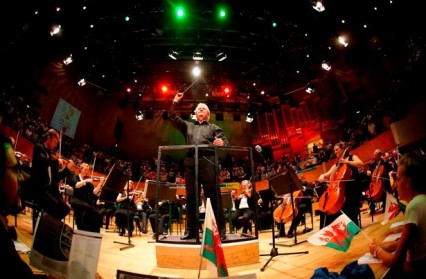St David’s Hall, Cardiff, July 18 2015
Classical Extravaganza!
Philharmonia Orchestra
Conductor: Owain Arwel Hughes
Rossini: Barber of Seville, Overture
Tchaikovsky: Swan Lake (Scene; Dance of the Swans; Waltz of the Flowers)
Faure: Pavane
Verdi: Aida, Grand March
Khachaturian: Masquerade, Galop
Massenet: Thaïs, Meditation
Williams: Star Wars, Main Theme
Wagner: Lohengrin, Prelude to Act III
Grieg: Peer Gynt (Morning; Hall of the Mountain King)
Sibelius: Finlandia
Strauss: Thunder and Lightning Polka
Elgar: Enigma Variations, Nimrod
Tchaikovsky: 1812 Overture
Before exploring the devilry of detail, we should record that Owain Arwel Hughes and his beleaguered Welsh Proms were blessed with a big audience and a standing ovation on the opening night. It was all this selfless and courageous patriot deserved; but it has come with anxiety and at a price.
Contrasting the opening with the start of the BBC Proms at the Royal Albert Hall in London the night before is tempting and salutary. Although unrelated, they are both summer fixtures and they both reserve an area for ‘promenaders’ to stand or sit where they can while concerts are performed. Or, at least, the Welsh Proms used to. This year the ‘promenade’, only ever a nominal area in front of the platform and often woefully under-populated, seems to have disappeared. But the similarities end there anyway. The Welsh version nowhere compares with the other in scale, scope or resources.
And were it not for the persistence and personal commitment of Hughes, its founder and ubiquitous conductor, the Welsh event might have hit the buffers a few years ago. Faced with an unprecedented withdrawal of cash support from Cardiff City Council last year and this, Hughes confessed a willingness to meet any shortfall from his own funds, a decision which at best reflects the desire of someone to see a tradition he created continue against all odds but at worst is almost a guarantee of diminishing returns. Embarrassment was averted this year by cash input from Cardiff University, University of Wales Trinity St David and the Welsh government to the business Hughes has created, Proms in Wales, to run the show. Even so, the Welsh Proms are currently not as they were, nor would Hughes expect that they could be in the circumstances and not just yet. He’s been magnanimous in refusing to blame the council for having to cut costs, but sponsors are still needed.
Although there are two commissions – and thus world premieres – in this year’s programme, these days the keyword is not so much ‘promenade’ as ‘procession’, as musical bits and bobs queue up in tick-box fashion under some umbrella heading or other. The opening night was a case in point. In theory, it was an opportunity for something special, such as marking an anniversary or sounding a contemporary Welsh note. Instead we were offered a list of arbitrary pieces that resembled the fatuous ‘league table’ approach to music. This is hardly Hughes’s fault, even though he is a populist. The Welsh Proms audience, up to a point, gets what can be afforded; in truth, it has always loved neat, undemanding packages, which tend to reduce items in the mass to the status of diversions, hurriedly served up. Even so, one wondered if those same audiences were becoming weary even of that approach. With Hughes ready to dig deep, ticket sales were crucial. On the first night, at least, he was vindicated with a full-ish and enthusiastic house.
His feat again this year, despite the fiscal forebodings, is to have booked a few leading orchestras: the Bournemouth, the Royal Liverpool and, on the first night, the Philharmonia. With this last, his method was to make of everything a concert piece. Rossini’s overture to The Barber of Seville was raised from the pit to gather something extra that had little to do with the way operatic overtures bubble away expectantly and in semi-darkness over what’s to come on the stage above. The Grand march from Verdi’s Aida cried out for meaning, which, of course, it would have in its rightful home. Nimrod from Elgar’s Enigma Variations, though plucked from its surroundings, was treated as though we’d already heard what had preceded it. (We hadn’t of course, and that’s the problem; but it also reflected Hughes’s integrity towards each selection.) We could have done with more from Tchaikovsky’s Swan Lake ballet music, less brashness from Sibelius’s Finlandia; perhaps it was his anniversary we were celebrating. With the Philharmonia fully-populated, the miracle was that Fauré’s Pavane and the meditation from Massenet’s Thaȉs sounded as fragile as they did as much as the reasonable expectation that Tchaikovsky’s Overture 1812 would do its best to make up for the lack of ancillary power often marshalled; perhaps here, economic straits properly inhibited excess. And so on.
Having the Philharmonia on hand – Klemperer’s Philharmonia – to offer what some might describe as a bag of over-sold musical lollipops, however meticulously handed out, might be looked upon as the shortest of short change. But that’s what reduced support for the arts and the uncertainty it creates is all about. The orchestra can do so much more, as Hughes knows; he’s conducted it often enough.
His standby beneficence deserves better. Everyone hopes that the series will live on to some kind of revival, certainly to a point where a few choral heavyweights, such as Walton’s Belshazzar’s Feast, can be heard again. It opened this year’s BBC Proms and featured the gargantuan forces – including, ironically, the BBC National Chorus of Wales – with which the composer eventually indulged himself. On a more modest plan, the work creates just the kind of musical environment in which Hughes thrives and excels. But he also did so at this concert, perhaps cheered by the sight of an audience that knows what it likes.



 Enjoyed this article? Support our writers directly by buying them a coffee and clicking this link.
Enjoyed this article? Support our writers directly by buying them a coffee and clicking this link.







